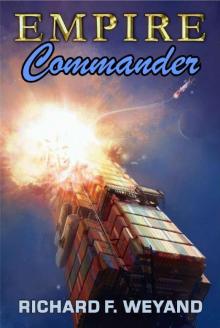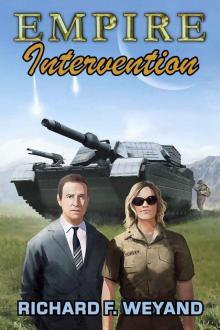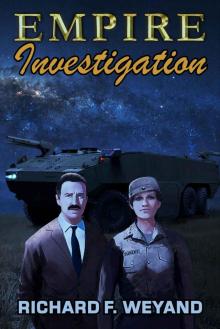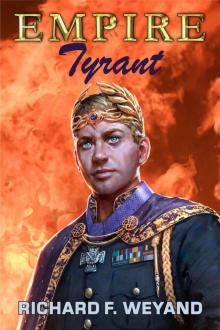- Home
- Richard F. Weyand
EMPIRE: Intervention (EMPIRE SERIES Book 13) Page 10
EMPIRE: Intervention (EMPIRE SERIES Book 13) Read online
Page 10
So far so good. Absent the proverbial wrench in the gears, things were moving according to plan.
That night, Kersey, Boardman, and Gulliver met in VR after they were all apparently in bed.
“So what’s your status now?” Gulliver asked.
“All the men and their encampment and supplies are on the ground,” Boardman said. “Everybody had hot mess tonight and are sleeping out of the weather. The rest of the work will be done tomorrow, and the camps will be all set up.”
“We’ve got the equipment scheduled to come down the day after tomorrow,” Kersey said. “A couple more days to get set up and we’re ready to go.”
“All right,” Gulliver said. “Today’s Tuesday, so that would be Thursday for all the equipment to come down, Friday and Saturday to set up. So Monday to start the training as scheduled would be good, right?”
“Yeah, that works,” Boardman said. “We’ll be good by mid-day Saturday, then we can let people blow off some steam Saturday night and relax Sunday. Be ready to go Monday morning.”
“How good is the weather forecasting system here?” Kersey asked.
“Pretty good, I think,” Gulliver said. “Imperial standard. At least, they’re running Imperial satellite monitoring and Imperial software. Why?”
“We’ve got heavy weather forecast for Monday,” Kersey said.
“Not good,” Boardman said.
“Maybe. It’s not supposed to come in until the afternoon.”
“Is that going to be a problem?” Gulliver asked.
“Maybe. Probably not,” Kersey said. “See, if you’re the defender, you generally want heavy weather. You’re dug in. It’s the mobile force that has problems, particularly mechanized forces, because of their weight-on-footprint. It doesn’t do a lot of good for aviation assets, either. But one thing tankers hate is mud.”
“You know, if it doesn’t come in until the afternoon, that could be to our advantage,” Boardman said. “We go active Monday morning, take our positions, and, once we’re dug in, the weather shifts. Makes it harder for them to attack our positions.”
“If the rain isn’t early,” Kersey said.
“Well, from my point of view, the possibility of rain helps my part of this.”
“How so?” Kersey asked.
“These high-ranking guys in the security forces are selected more for their political reliability than, say, their work ethic. They would much rather be out on the golf course than in the office. They hate the office. But if there’s bad weather coming in....”
“They can’t golf, and they’d rather be in training than in the office. It’s a lark,” Kersey said.
“Exactly. Another excuse not to work,” Gulliver said. “It means there won’t be a lot of absentees who slip by us.”
“Wait a minute,” Boardman said. “They have golf in this shithole?”
“For the regime and its cronies? Sure! Well out of site of the plebes, of course.”
“Oh, of course,” Boardman echoed, shaking his head.
“OK, so if the weather holds off until maybe noon, this can all work out.”
“And if not?” Boardman asked.
“We may have to move the armor to the highway early. Under cover of darkness.”
“Roadblocks and VR suppressors and the like?”
“Yeah. If we have to,” Kersey said.
“That’ll work.”
“And otherwise?” Gulliver asked.
“Otherwise we’re good. My only real worry right now is the weather. Once we’re on the highway, we’re OK. Well, that and the equipment at the dam site being discovered before we go active, but it being a weekend actually helps us there.”
Gulliver nodded.
“All right, then,” Gulliver said. “We’ll just keep to the plan and the schedule as is.”
On Thursday morning, Boardman and Lucas Joubert were back out at the dam site to see the equipment come in on the big cargo shuttles.
One shuttle had a load of twelve standard containers, which it set down in three sets of four, off to one side from the encampment. The other two had but four containers each, eighteen feet wide and marked in wide stripes with weight warnings. These they started setting out in two rows leading away from the twelve normal containers.
“That there’s the maintenance and repair area, in front of those regular containers. Like the motor pool, ya know,” Boardman said, pointing into the area from their vantage point near the highway. Those wider ones, that’s the equipment itself.”
“I see,” Joubert said. “Will they start unpacking the big machines immediately then?”
“Nah. Gotta set up the motor pool first. You gotta track hours on the engines, fuel consumption, when to change the oil, who’s scheduled on what machine when, all that shit. They’ll spend all day tomorrow getting that set up before they break for the weekend.”
“Ah. Well, those bigger containers are certainly impressive.”
“Wait’ll you see what’s in ‘em,” Boardman said. “That’ll be Monday.”
At the spaceport, too, deliveries were being made. This included twenty-four armored assault shuttles, delivered to the spaceport tarmac, munitions for the shuttles, including both missiles and gravity bombs, redundant air traffic control modules, hundreds of recon drones, redundant aerial recon command modules, and two full communications suites, each including a communications command center, its own independent power generator, and an antenna system that deployed from the container-sized module it came in. Redundant items were located well apart from each other to prevent destruction of both by a single event or munition.
Another delivery was being made at the spaceport. A thousand conference chairs, a couple of dozen food service tables, drink coolers, a lectern with PA system, and other items were being delivered to the empty warehouse across the service road from the spaceport encampment. Gulliver and his contacts with the training department fussed over the arrangements.
“It just occurred to me, Mr. Gulliver, doing all this set-up work. Why aren’t we doing this training in VR?”
Gulliver had been expecting this question at some point, and he had an answer ready. He responded in his soft-spoken, hesitant persona.
“Experience has shown that doesn’t really work for these systems. People need to be able to see the system components, ask questions on the spot and have them answered with a demonstration. All that sort of thing. At least, that’s what I was told.”
“Ah. I suspect it actually could be done in VR, but then the vendor couldn’t charge as much.”
“Perhaps,” Gulliver answered with a shrug. “But since the Empire is paying for it all, we might as well go deluxe, eh?”
Darrel Thompson received a message from his resistance contact, Samuel Adams, that he should be prepared, as things were building to a head and he could be called to action at any time.
Thompson went back into the Imperial Marines training simulator and practiced opening his duffel, donning the armor and cover, and shouldering the ruck sack several times. The first time, he flunked the exercise because he forgot to pull the pin on the IFF module on his cover. He corrected that in later attempts, and finally beat the simulation’s requirement for the time it took him to prepare.
On Friday, Minister of Security Hubert Land placed a meeting request with President James Mieland. Mieland got back in touch with him within the hour.
“Hi, Bert. What’s going on?”
“Mr. President, we’re picking up some indication from our informants that the resistance is building toward something. Do you want us to step up our patrols or bring people in for questioning?”
“What’s the status on our new equipment?”
“It’s actually all on the ground, now, sir. The training personnel came down Tuesday, and all the equipment came down yesterday. They’re setting it up now for the training classes. We start the training on Monday.”
“Excellent. You did a great job there, Bert. Let’s do this then. Let�
��s not give the resistance any indication we know they’re building up to something. Let’s get our people trained up on our new capabilities, and then we’ll hit them hard. Once we have the new equipment available.”
“Yes, sir. And in the meantime?”
“Tell our people to ignore what they’re up to. We don’t want to tip them off we know they’re up to something.”
“Yes, sir.”
By the end of the day on Thursday, everything was on the ground, both manpower and equipment. They had actually made insertion of Turley’s entire force for the operation into the combat zone without any opposition whatsoever.
By the end of the day on Friday, her operations centers were all up and running. Air traffic control, the aerial reconnaissance center, the communications center, and her own brigade command headquarters were all manned and functioning.
Now if they could only stay in character and keep everything under wraps until Monday morning. The good part was that it was the weekend, and the Security Ministry and the Secret Police ran skeleton crews over the weekend.
Training Day
At 2:00 AM on Monday morning, line maintenance crews moved out across the equipment area of the dam site encampment. They worked in the dark, using vision amplifiers. This was ho-hum stuff. What else is new?
The crews worked from container to container, breaking the seals on the bigger containers, moving inside, firing up electrical systems, checking status. At each unit, they unhooked all the big shipping restraints and filled the fuel tank from the fuel truck that accompanied each team.
They worked deliberately and methodically, moving about cautiously in the dark, aware that missteps in black-out conditions could cause serious accidents
When dawn came, there was no one about in the equipment area. All looked as it had been.
But everything was fueled up and good to go.
Monday morning was sunny in Monroe, but nasty weather on the eastern horizon meant the prevailing easterly would bring rain soon. Turnout for the training was therefore very good. A dozen buses brought most of the participants from the Government Center complex near downtown Monroe. Some were wearing sidearms, though most were not. The higher-ranking came in their own cars, while the brigadier general of field operations, General Milton Kerrick, came in an armored limousine with Special Police escort vehicles before and after.
They started showing up at 8:30 for the 9:00 training. Kerrick was known to be a ball-buster about people being on time, and he showed up at 8:45. Everyone else was in the building by 8:55, not wanting to incur his wrath. This was just fine with Gulliver, who had worried about a late start, with everyone on General Turley’s staff on pins and needles awaiting the kick-off.
Let’s not screw it up now, Gulliver thought.
Gulliver had given a lot of thought to who should give the training. Even a high-ranking officer would be matched or beaten in rank by a lot of the people in the room. In consultation with Kersey and Boardman, he had selected instead a senior NCO, a big, no-nonsense sergeant major, the sort of person who could make out-of-line officers wither with a look. Officers – good officers, anyway – deferred a lot to their senior NCOs, and Gulliver was counting on that.
Upon entering the warehouse building, the student-officers found themselves in a large room, with a thousand chairs – thirty-five across and thirty rows deep – in a large square array in the center. They faced a lectern and a large display screen on a dais. Ranked down the near side of the room was a row of food tables, where food-service workers were laying out drinks and snacks for the mid-morning break. There were also tables in a row down the other side of the room, presumably for lunch
It was the most ordinary thing, the quintessential large lecture setup, and evoked no curiosity or suspicion at all.
No one noticed the VR suppression and surveillance equipment mounted on the exposed wooden rafters far above, behind the bright hanging fixtures lighting the space.
At a couple of minutes before 9:00, Sergeant Major Janos Paszek, wearing MCUs with arm rank badges and a stack of time-in-service bars on the sleeves, walked out to the front of the room, eschewing the microphone and PA system, and stood at-ease in front of the lectern.
“Let’s take our seats, please, everyone.”
Paszek’s parade-ground voice penetrated through the hundreds of conversations, which broke up as people moved to seats and sat down. Paszek moved around behind the lectern, from where he watched the progress much like a schoolteacher watching disorderly students jostling in the lunchroom line, that special look of disapproval only certain occupations could master. When all had taken their seats, he spoke normally into the microphone and let the PA system carry his voice to the back rows.
“OK. Let’s get started. Today we will be familiarizing you with a number of new weapons systems with which your forces are being provided. We will start with the short-barreled rifle, or SBR, and move up to bigger and bigger systems as the day proceeds.
“I have enlisted the aid of a number of my men to demonstrate the features of the SBR for you this morning.”
Forty men in double-file fast-timed it into the room through the big door at the front corner of the space. They were all dressed in MCUs and carrying SBRs. They split into two lines, one across the front of the room, and one down the side in front of the banquet tables, the food-service people behind them.
Confusion was starting to grow in the room, as some people realized their VR implants were no longer in contact with the VR system.
“The first feature of the SBR I want to show you is the muzzle,” Paszek said, and all forty riflemen raised their weapons and pointed them over the heads of the audience.
“No one move. You are being detained,” Paszek said, much louder than before.
Two majors and a lieutenant colonel jumped up and tried to draw their sidearms, and each was shot high in the center of the chest by the rifleman assigned to their section of the audience. Several of the food-service people screamed, and they ducked down behind the tables.
“HALT!” Paszek shouted into the microphone, and it rang out across the room.
“Always some asshole gotta ruin it for everybody. If we wanted to kill you all, we could have just bombed the building. Right? So let’s all calm down, and you can all go back to your families tonight or tomorrow, OK?”
The tension in the room eased a bit, and Paszek continued.
“We are going to continue with food service and the like. We’re just going to hold you here in this room for a while. Which is what you were expecting today anyway.
“One thing we need to do is relieve those of you carrying sidearms of your weapons, so we can avoid any further unpleasantness. Now, this building is under surveillance, and the computers watched you come in and tracked your movements. We know who is carrying sidearms and where you are. So ain’t no sense trying to hide it and getting shot for your trouble. Right?
“Here’s what we’re going to do. When I say ‘Hands,’ everybody with a sidearm hold up your hands.
“Hands.”
Perhaps a hundred and fifty people held up their hands.
“OK. Good. Now. We’re going to go left to right, one row at a time. You there, in the front row. You’re one. Call out your number, then stand up and move over to those empty tables. Unholster your sidearm and set it on the table, then go back to your seat. Be sure to keep the muzzle pointed at the ground or you’ll get shot. Only one person stand at a time, and don’t stand until you call out your number. Nothin’ fancy, OK. My guys got families to go home to, too. We would hate to shoot you, but better you than us from our perspective, right?”
The indicated officer, a major, called out “One,” moved over to the empty tables along one side of the room and set his weapon down on the table. He returned to his seat and sat down.
“Hands.”
Those with sidearms raised their hands again, and the next fellow in the first row called out “Two.”
Paszek nodd
ed, and the fellow got up and placed his sidearm on the side tables, then returned to his seat.
“Hands.”
“Three.”
“See. All nice and easy. Just keep it up and everyone gets to go home later.”
When no one responded to the call of ‘Hands,’ and all the sidearms had been collected on the side tables, Paszek looked out at one fellow in the crowd. Paszek and his men were tied in to the Julian Brigade’s private VR, and were in communication with the surveillance people.
“Lieutenant Colonel Forney. Would you like to place your sidearm on the side tables now, or should I just have you shot where you sit?”
“One forty-eight,” Forney called out.
He got up and walked to the side tables and put his sidearm down with the others, then returned to his seat.
“See what a nice guy I am?” Paszek asked the officers. “We could have just shot him, but we really don’t want to harm you. We just need to keep you out of the action for a while.
“Now, nobody get frisky while we wall off your weapons.”
Motorized sliding wall panels used to partition the big warehouse for use by multiple firms moved forward from the far end and formed a wall between the seating area and the tables with the sidearms. They moved into place and locked to each other, extending all the way to the front wall and sectioning off the weapons.
“All right, gentlemen. We are going to sit here today, and enjoy the air conditioning and each other’s company. We have some very nice meals set up for you. And if everybody behaves, you all get to go home later. Isn’t that nice?
“First, I’m going to ask the two of you sitting on either side of the three gentlemen who thought they could draw on forty Imperial Marines to pick up their bodies and carry them to the back of the room. There is a pile of body bags there. Please put each in a body bag and zip ‘em up. We’ll return their remains to their families when we let you all go home.”

 EMPIRE: Succession
EMPIRE: Succession Commander
Commander QUANT (COLONY Book 1)
QUANT (COLONY Book 1) EMPIRE: Renewal
EMPIRE: Renewal GALACTIC SURVEY (COLONY Book 3)
GALACTIC SURVEY (COLONY Book 3) Campbell- The Problem With Bliss
Campbell- The Problem With Bliss EMPIRE: Intervention (EMPIRE SERIES Book 13)
EMPIRE: Intervention (EMPIRE SERIES Book 13) EMPIRE: Investigation
EMPIRE: Investigation A Charter for the Commonwealth
A Charter for the Commonwealth EMPIRE: Resistance
EMPIRE: Resistance EMPIRE: Warlord (EMPIRE SERIES Book 5)
EMPIRE: Warlord (EMPIRE SERIES Book 5) EMPIRE: Resurgence
EMPIRE: Resurgence EMPIRE: Conqueror (EMPIRE SERIES Book 6)
EMPIRE: Conqueror (EMPIRE SERIES Book 6) Tyrant
Tyrant Usurper
Usurper Galactic Mail: Revolution! (Childers Universe Book 3)
Galactic Mail: Revolution! (Childers Universe Book 3) Galactic Mail_Revolution!
Galactic Mail_Revolution! Childers
Childers CHILDERS_Absurd Proposals
CHILDERS_Absurd Proposals